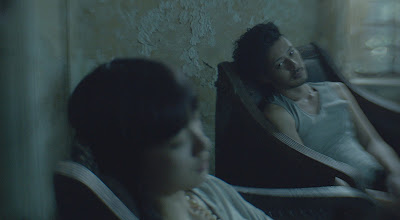I first came across the work of Masaaki Yuasa with 2010’s “Tatami
Galaxy”. With the ever-quick dialogue and the constant changing of visual
styles, it was clear his style is to assault your senses rather than allow you
to relax into an anime. With repetitive narrative, but stylistic variation, you
can just about get through a twenty minute chunk episode, one at a time. A
feature film, therefore, may feel a step too far for this style of working. But
with a title such as “Mind Game” and my aforementioned experience, I knew I was
in for a slight fudging of the head.
Adapting Robin Nishi’s manga of the same name, the aptly named Nishi bumps
into old friend – and less-than-secret-crush – Myon on the train one night in
Osaka. Myon invites him back to her family restaurant, where they sit and eat
with her sister, Yan, and no-good father. It is here where two yakuza enter the
fray looking for her father and after a butt-clenching near-death experience,
Nishi and the two females make haste to escape the wrath of the yakuza.
It is here where things start to get a little peculiar. The yakuza
forming a road block over a bridge, the trio, in a car stolen from the yakuza,
are launched into the water below and into the mouth of a whale. Here they find
a quiet place to rest in the makeshift living quarters of Jii: a man trapped in
the whale for some thirty years. Getting comfortable, the film slows a little
in pace, losing its frantic edge, though is equally creative in the scenes of
play the quartet enjoy.
This cannot last forever, however, and the trio get the urge to escape
the whale and again see blue skies. Hatching a plan, a frantic chase ensues to
escape the whale’s mouth, with memories and dreams flashing before each as they
run to freedom. Before we start all over again.
But I’ve missed out some bits here…quite a few bits. The film’s
introduction is an endless stream of visual imagery that is seemingly
unconnected. This fast and frantic style brings a lot to take in initially,
though is enjoyable to watch as the colourful variety in the images flashes before
your eyes, in a similar way to Satoshi Kon’s subsequent “Paprika”, blurring the
lines between reality and fantasy. As the film progresses, however, with the
opening repeated to come full circle, this is more than a simple stream of
consciousness to look pretty.
At key points for each character, nostalgic memories and possible hopes
for the future flash before their eyes, forming this montage when combined at
rapid speed. These stay with the character’s throughout serving as points of
motivation to escape, and giving the film a well-rounded completeness on
conclusion.
There are many apparent “mind games” at work here: flashing mind’s eye
visions throughout the narrative; and the literal “Sliding Doors”-esque twist
of fate at the end showing how it could all have been avoided and life would
have been different in an alternate reality – repeating the initial scenario
once more in a “story that has never ended.”
There are a large number of ideas to take in, but Yuasa handles this
well enough to avoid unwanted overload for a feature length. The dialogue is sparser
than in “Tatami Galaxy”, something of a relief to a non-native Japanese
speaker, and so the film can be enjoyed, as oppose to endured, with moments of
relaxing animation to provide respite.
Jasper Sharp’s introduction as part of the London East Asian Film
Festival notes how its 2004 release coincided with a pivotal year for anime:
the release of Miyazaki’s “Howl’s Moving Castle” and Otomo’s “Steamboy” as well
as Oshii’s “Innocence” screening at Cannes. With “Mind Game”, Yuasa’s name can
fit alongside this company comfortably for originality and style that lives long in the mind.















